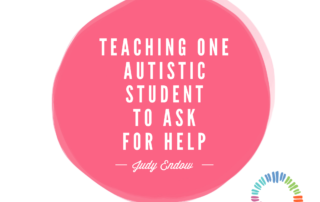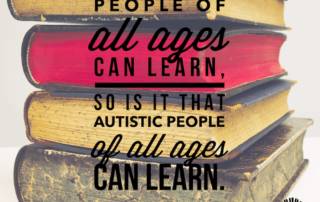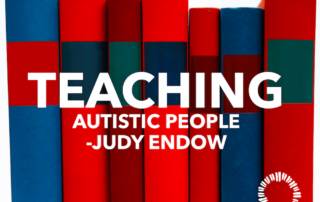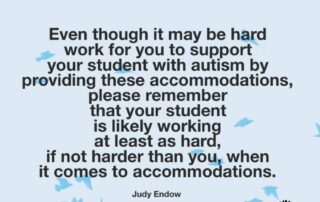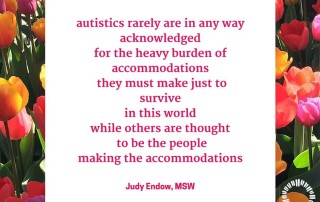Teaching One Autistic Student to Ask For Help
Teaching One Autistic Student to Ask For Help by Judy Endow During the past school year I worked with a third grader diagnosed with autism as he returned to school after being discharged from a treatment center. Jake displayed many behaviors that did not work well in the classroom. These behaviors occurred predominantly during math class. Jake’s scores in math were 82 – 90 percent over the previous quarter. With these scores, it did not appear that he was struggling in math. I discovered that most of Jake’s behaviors stemmed from frustration. Jake knew when he needed help, but
Teaching Autistic People
by Judy Endow Autistic People of All Ages Can Learn Just like people of all ages can learn, so is it that autistic people of all ages can learn. It is an utterly sad state of affairs that this even needs to be said, but unfortunately, it needs to be said. Too often I see autistic children being babysat rather than being taught at school. When I ask about academic curriculum being used, I am told, “Oh, he has autism” as if this is an answer to my question. In my work as an autism consultant I am called on
The Changing Implementation of Accommodations
The Changing Implementation of Accommodations Accommodations are something provided by law to people with disabilities. It is easy for people to understand physical accommodations such as wheelchairs and curb cuts. It is much more difficult for people to understand accommodations when it involves sensory and processing differences such as those common to autistic people. Because an autism diagnosis is one of a spectrum diagnosis there are a variety of ways autistic people experience their particular autism. In fact, even though there may be similarities, just as no two neuro majority people experience the world in exactly the same way,
Autism Visual Thinking and the Parking System
Autism and Visual Thinking Many autistic people think visually. As a young child who thought visually I was often thought to be stubborn and insisting upon my own way when in reality I was merely trying to keep ahold of a thought. Today in my work I come in contact with many on the spectrum and see the same phenomenon at work. Let me explain with two examples: Example Parking Objects: Every day Britt comes to school with a toy from home. It is very difficult for her to leave the toy in her cubby so she carries it
Autism, Accommodation and Differential Expectations
People generally are very pleased with themselves when they have made an accommodation for me. I know this because they proudly announce it! In turn, I have learned to say thank you when people announce their thoughtfulness at making an accommodation for me. I truly am thankful because it allows me a fuller participation in the events going on around me. It also makes me smile because I have been making accommodations for people my whole life and it has never occurred to me to announce it!
Visual Accommodations and Blessings of My Autism
The visual sensory aspects of the way autism plays out for me most of the time means that I get too much information delivered – things are too big, too bright, too bold – typically too much to endure all day. Practically, this means I need to accommodate my sensory system in a variety of ways. Let’s take but one example from my life where visual overload is a pretty constant problem. Here are some things I have found helpful: Environmental Accommodations for Overhead Lights Most of the time I simply do what I need unless it
Accommodations – They Make All The Difference
Accommodations are important and they work. I should not be making a big deal about it. The ADA is 25 years old. Sadly, getting the accommodations we, disable people need, is often the opposite of simple. If you have been reading my posts, you know that I am very visibly disabled. I am also proud, and I don't try to be someone other than myself. I do require a lot of supports, and once I have them, I can do anything I set up as goals. I have goals, or simply things I want to do, that most people
How Being Included Changed This Boy’s Life
Having opportunities to learn with everyone could access more opportunities for all.
How to Figure Out If an Autistic Needs Fixing
I have autism. I am autistic. Both these statements describe me and both are true. However, these two statements are NOT equal.
Closed Captioning Helps All Students
"Not only were students talking about how much having the captions helped them as they took notes, their test scores went up," Collins said. During the first year of a 2-year case study, he showed videos without captions to establish a baseline of student comprehension, then in the second year turned on the captions and began to see improvement in comprehension and grades. "During the baseline year, there were a lot of Cs. In the second years, they went from Cs, Ds and Fs to As, Bs and Cs. It was really significant improvement," he said. "We're living in an
Putting Education First by That Crazy Crippled Chick
"First, we must ensure that all children, including and especially those with disabilities, receive a quality education. Inclusion means nothing if a child is not receiving a good education, which is, in fact, the very reason we have schools in the first place. " Cara Liebowitz
What’s the Difference between Reduction in Homework and Shortened Assignments?
By Kori Hamilton and Elizabeth Kessler, professional special educator and NICHCY advisor. Being able to provide ample opportunities for success to all students requires a clear understanding of the needs of each individual student. Every student has a unique learning style, and some students require more help than others. Students who receive special education services have a plan in place to identify the type of support(s) that’s needed. One type of support is an accommodation, which is a change that helps a student overcome or work around the disability. A modification, which is a change in what is being taught

